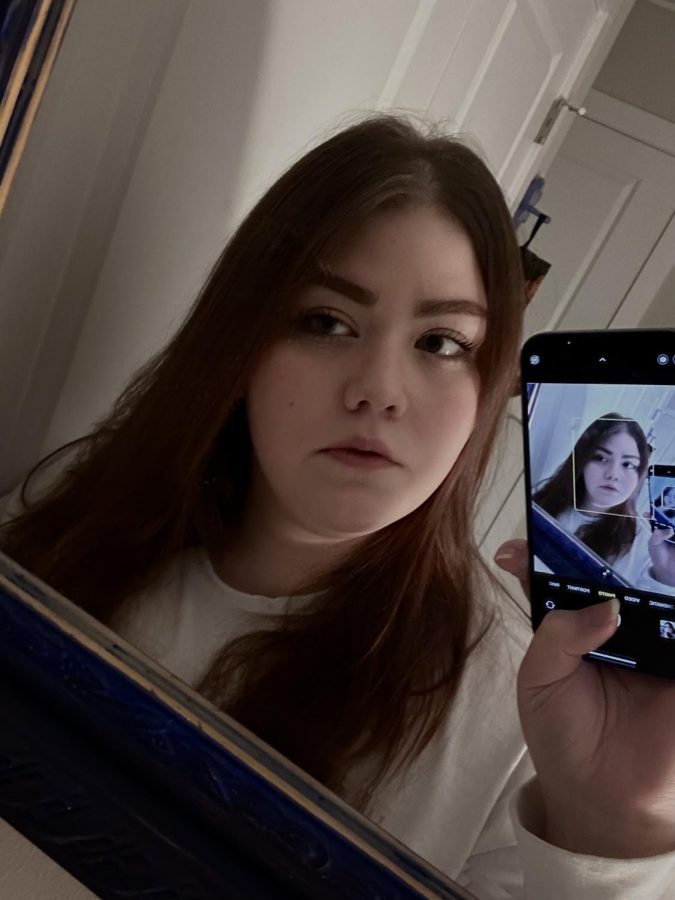Nontraditional students may come from a variety of backgrounds and experiences, but share a common drive to complete, or further, their education. At IU Southeast, these students have a place to call their own, and a staff member focused on helping them succeed.
Kimberly Pelle is the manager of Adult Student Services and Coordinator of Nontraditional Student Programs. Many nontraditional students at IU Southeast make use of the Adult Student Center, located on the second floor of University Center South, and open 24 hours a day.

“I think the Adult Student Center is important to the retention of these students, because when life throws you a curve ball, school will be the first thing they take off their plate. Having the support of advisers and other students that are in their same situation helps to keep them here,” Pelle said.
Nontraditional students make up about 42 percent of the student body at IU Southeast. The National Center for Education Statistics defines a nontraditional student as one who delays enrollment (does not enter post secondary education in the same calendar year that he or she finished high school), attends part time for at least part of the academic year, works full time (35 hours or more per week) while enrolled in college, is considered financially independent for purposes of determining eligibility for financial aid, has dependents other than a spouse (usually children, but sometimes others), is a single parent (either not married or married but separated and has dependents) or does not have a high school diploma (completed high school with a GED or other high school completion certificate or did not finish high school).
“To me, the nontraditional student has priorities in their lives other than school,” Pelle said. “For example, if I asked a traditional student, ‘What is your main priority?’ they would say, ‘Getting my college education.’ But a nontraditional student would say, ‘My family, my children, my job.’ There are other priorities in their lives that are really more important than school.”
Chris Robertson, nursing junior, is married with two young children and a third on the way. He takes twelve credit hours per semester and works full time as a massage therapist.
“I really don’t know how I do it”, he said. “Somehow, it all just works. The key is my wife, because she does a lot too.”
Robertson said he wants to earn his degree so he can get a better job to provide for his family. He said he uses the Adult Student Center a lot because there, he doesn’t have to bridge a generation gap.
“I like it because it’s with adults,” he said.
Pelle said she has found nontraditional students enjoy being around a group of their peers.
“The encouragement, the support, the shoulder to cry on, can mean a great deal,” Pelle said. “And it’s important to have that place to come when they need to get away from it all. They make connections with other students in there. They might not feel so comfortable hanging out in the game room or the coffee shop. They know they can come up here, sit quietly alone or with friends and do their homework.”
Pelle was a nontraditional student herself, so she knows the unique challenges and obstacles that these students face.
“I want to make those students more comfortable with their decision to continue their education. I want to support them and share experiences with them and let them know it can be done,” she said.
Theresa Haskins-Smith is pursuing a master’s in liberal studies with a concentration in gender studies.
“A lot of times we get tied up in saying, ‘I’m too old to do this or that.’ Age has nothing to do with it,” she said. “I think learning is a life-long process.”
Haskins-Smith works as the Home School Coordinator at Fairdale High School. She works with at-risk students who have attendance issues, and tries to instill in them a love for education. She also has her own educational goals.
“I want to make a difference in other women’s lives. My goal in life is to one day lobby in Washington, D.C. for a program that would encourage women to go back to school,” she said.
Haskins-Smith can frequently be found at the Adult Student Center, and said Pelle is a “great lady.”
“The one thing I want to tell adult students,” Pelle said, “is that when you make the decision to come back to school you cannot rush it. We didn’t do it when we should have, after high school, and now we have all of these other commitments in our lives. You cannot expect to get out of school in four years. Don’t cry over spilled milk. The past is the past, look to the future. Keep your goal focused, keep it in mind and work towards it at a reasonable pace, so that you are not a drop-out statistic.”
John Duerr is a business management junior, with a minor in communication, and serves as an Orientation Leader on campus. He started school at IU Southeast in fall 2006, after two years of active duty in the Army. Duerr said that for him, the advantage to not starting college straight out of high school is that he had time to relax and think about what he wanted to do.
“Going in the military gave me a chance to gain discipline, so I can come in here and maintain focus and a full-time job, because I’ve still got to make the bills,” he said.
Duerr said he’s in the Adult Student Center two or three nights a week, and most of the day on Sundays.
“I like it because it’s quiet, without a lot of traffic going through. I also like the speakers [on the computers] because some of the courses I’m taking require me to listen to things. If no one’s in here then I have ample opportunity to do that,” Duerr said.
Pelle has designed and promotes programs for adult students at IU Southeast such as “Parents Night Out,” where students with children may drop off their kids for three hours. She provides activities for the children, and the student parents get free time to do whatever they want.
Pelle also hosts Diversity Brown Bag luncheons every month which cover topics such as gender respect or how to cope with divorce. The luncheons often include a guest speaker.
There are financial aid and career workshops, and Global Grounds, an international coffee hour, co-sponsored by the International Student Office.
The programs change, so to keep students informed Pelle places fliers across campus, posts ads on the campus calendar and The Planet and also provides information to The Horizon’s ‘What’s Happening’ page.
Pelle also provides computer assistance to students who use the Adult Student Center.
“Some students come here with limited technology skills, unfamiliar with the Internet in some cases, and certainly unfamiliar with the programs that they’re going to need to succeed on campus,” she said. “So I’ll do Powerpoint presentations, or workshops for them. I’m always there to help them become a little more tech-savvy.”
“I think nontraditional students are the bomb,” Pelle said. “I think they make the college experience for the professors, for the younger students, for the staff, much better, because nontraditional students are so insightful. They’re ready to tell you about themselves, and they’re not afraid to speak out in classes. I think nontraditional students make the college experience wonderful for everybody on campus. They’re serious students, not here because their parents made them come, but because they’ve been out there and they know what they need to be successful for themselves and their families.”
By DARIENNE ARCURI
Staff Writer
darcuri@ius.edu






